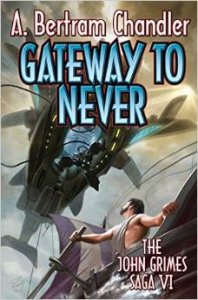Paul Di Filippo reviews A. Bertram Chandler
Gateway to Never, A. Bertram Chandler (Baen 978-1-4767-8047-4, $14, 656, trade paperback) May 2015
 In 1985, at the age of thirty, I decided to start a database of all the books I owned. I was freshly embarked on my dream of becoming a professional SF writer. I think maybe that transition formed a subconscious reason for assessing and cataloguing my library. But the main reason I recall was so that I could carry around a printout of my holdings when I went book-shopping and avoid buying so many damn duplicates of forgotten titles I owned but hadn’t read and remembered.
In 1985, at the age of thirty, I decided to start a database of all the books I owned. I was freshly embarked on my dream of becoming a professional SF writer. I think maybe that transition formed a subconscious reason for assessing and cataloguing my library. But the main reason I recall was so that I could carry around a printout of my holdings when I went book-shopping and avoid buying so many damn duplicates of forgotten titles I owned but hadn’t read and remembered.
At this time, my books—maybe 2000 or so—were indeed divided into read and unread shelves. I had no sophisticated software for indexing—1985, remember?—so I just started grabbing books and typing their data into a word-processing file, alphabetizing manually by author as I went.
For some reason, I decided to make two separate files: the read and the unread. I could have collated the titles, but I did not.
Now my library numbers about 14,000 books, and I still capture the data on each new entry.
In retrospect, I am glad I divided my holdings into two categories, because one of these files represents a 1985 snapshot of all I had purchased and read from about age twelve to age thirty. The formative stuff, prior to trying to become a professional. I see vast swathes of van Vogt, Ellison, Asimov, Moorcock, PKD, JGB, Simak, Heinlein, Andre Norton, Poul Anderson, Gordon Dickson, Brian Aldiss, and so many other titans of the field, many swallowed whole as a teenager, when time to read seemed infinite.
With an eye toward the book under discussion today, I went to check on my record for A. Bertram Chandler, and was disconcerted to find I had read by then only The Coils of Time and Into the Alternate Universe, while on the other side of the ledger sat about two dozen purchased but untouched volumes of his.
And you know what? I do not believe I have read another Chandler book in the past thirty years.
This is inexcusable, although perhaps understandable. There is simply so much out there to read, new and old, that wonderful authors without a high profile—especially once they are deceased—can get lost in the noise.
But today I and others in my fix have no excuse not to get up to speed on Chandler, since Baen Books is giving him the omnibus treatment, as they did for Poul Anderson and Christopher Anvil, among others. The current volume is number six.
I would have liked also to survey the prior five volumes for this same essay, but guess what? Time did not permit. So we will only dip a toe into the career of Commodore John Grimes. I note from the very handy list at Wikipedia that the three novels here constitute the very final ones in internal continuity, so this book—which also includes six short stories and a memoir by Chandler, full value indeed—will be the capstone of their series, I think.
The first novel is The Gateway to Never (1972), and immediately we imbibe the pleasures of Chandler’s mythos and admire his deft strategies. We open on Grimes the desk-warrior in his office, and learn within one page not only his current status and duties, but also concrete details of his past: a clever narrative maneuver to get newbies onboard and reaffirm the fond memories of the veteran fans. Then comes the central MacGuffin of the narrative: the prevalence of drug smuggling in the Rim Worlds (nicely distinguished by place and culture as a separate polity from the several other galactic alliances). Grimes has a brief chat about his assignment—to find the source and smuggling route of “dreamy weed”—with his smart and funny wife, in the manner of Simenon’s Maigret and spouse, or Nick and Nora Charles. Then our man is off, hanging undercover with the orgiastic “Blossom People,” visiting an offworld spa, and eventually meeting bad guy Drongo Kane and surviving the opening of the “gateway to never.” A perfect artifact of the hippie era as seen from the straight world, this tale is like one of those late-career Ross MacDonald novels.
In just about 150 pages composed of swift short chapters, heavy on the light-hearted dialogue, with only minimalist descriptions, we get vivid characters—Grimes is a salty, irascible softie, old-fashioned but empathetic, with a code of honor, but not inflexible—a solid plot and a negligible but not nonexistent quota of speculative bits. Although to be sure, a far future that still uses “blue pencils” and typewriters was a tad lazy even in 1972. But the amiable, affable Chandler is not here to be Wells or Verne, he’s here to be a modern pulpster, a Max Brand or Hugh Cave or E. Hoffman Price. Is it banal to say wistfully, “They don’t write them like this any more”…?
In contrast, The Dark Dimensions (1971) offers solid stefnal wonders in spades. Fifty light years outside the Rim of our galaxy lies an abandoned alien ship, the Outsider, whose mysteries have never been fathomed by the unsuccessful prior expeditions, and so humanity has turned its back on the enigmatic hulk. But now a craft from a rival to the Rim Worlds is heading for the treasures, and Grimes is commissioned to thwart the intruders.
This time Sonya, Mrs. Grimes, comes along, in her “Survey Service micro-skirt” that possibly bespeaks Star Trek influences creeping into a prose series that predated the show. The Trek-like ambiance extends to the plot, which sees Grimes’s vessel, the Faraway Quest, meeting cross-dimensional travelers due to the weird timespace around the Outsider, including a Grimes doppelganger and a surprise guest from another famous SF franchise.
The Way Back (1976) opens directly upon the closure of its predecessor. Grimes and crew have been displaced in spacetime and must somehow engineer a return to the world they know. They eventually get as far as the Earth of the ancient Greek era, but there things go kerflooey, due to internal dissent among the castaways. However, some heroic actions on the part of Grimes and seven of his allied comrades produces a happy ending to the Robinsonade. Although Grimes’s closing thought about facing a Court of Inquiry to account for the cockup is a wry note upon which to conclude the saga. Heroism is fleeting, bureaucracy is forever.
The assorted short stories offer some nice readable interstitial adventures, including a couple of first-person narratives by protagonists other than our hero, giving us a chance to see him from the outside, so to speak.
These three novels, the essence of workmanlike competence, like all series installments, offer both variety and the solace of repeated touchstones. Grime’s habit of vocalizing “Mphm” as a wordless expletive. His favorite saying of “Spit on the carpet and call the cat a bastard.” These tics, if you will, are interspersed with fresh elements in a highly palatable matrix that conduces toward the pleasures we all seek in returning to familiar literary friends.
The memoir, “Around the World in 23,741 Days,” is a delight, revealing that the fellow behind Grimes is pretty Grimesian himself: insouciant, adventurous, not suffering fools gladly, yet cognizant of his own sins. Chandler had a full, rich life, not without its challenges, that allowed him to craft stories that reflected his easygoing, optimistic, can-do attitude mixed with a sense that the world held lots of wonders. Once upon a time, that fusion was the essence of science fiction, and still holds vast appeal.





1985 was around the time I *stopped* cataloging my books—all I did were my SF paperbacks—I never did my magazines—but then I started getting prosperous enough to buy the hardcovers, and started branching into other areas…
Even then I was just above two thousand books. I’ve bought a lot of duplicates, some quite deliberately—a certain preference for trade paper editions over regular paperbacks, wanting a good read while I was away from my main library, wanting something I could carry in my lunchbox to work—sometimes inaccessibility behind other stacks of books—but duplication from plain forgetfulness does happen, too.
Someday, maybe when I retire, I’ll resume cataloging. The sheer bulk of them is getting to be a problem…
By the way, A. Bertram Chandler was well worth it. In the day I did pick up what I could of his—but, what with how long the John Grimes series was, and how many different publishers put out volumes, I was never sure of how many books were in the series.